|
Enter content here
Torrential rain flooded Sofia yesterday. In numbered minutes the streets looked like a high tide. The downpour brought the long desired cool, though. Photo: Victor Levi
All NLA's Men: An Instrument For Greater Albania.
Aktuel - Reality Macedonia
By Dragan Antonovski,
Translated by VM
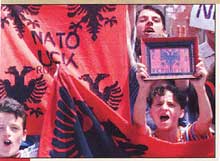
Indoctrination starts as early as possible: Albanian children used in demonstrations.
Some time ago, when a group of experts asked me what is the difference between the Macedonians and the Albanians, I told them without much hesitation that the Albanians are mainly illiterate inhabitants, but they respect the literate ones and trust the educated, or their leaders. They know how to obey, and because of that they have an excellent international position. When it comes to Macedonians, their population is one semi-literate and precisely that makes them sceptical about everything. This frustrating semi-literacy results into missteps, blockade of everything that can be called step forward, trust in a leader, endurance with any kind of national stance, or--God forbid--stake into the future of the country. Macedonians have a state; but they dont have a leader. The Albanians do not have a state, but they do have leaders.
Given the disposition of forces, the only people capable of succeeding in such an environment are the ones who can learn from other peoples mistakes. The observation that the main direction of the Albanian movement remains constant does not come as a surprise, even to those [non-Albanian nationalists] who claim that they "don't give an inch of our land to the Shiptars" [pejorative term for Albanians]. The roles and actors do change, but Greater Albania remains the final goal, with or without borders, regardless of all international integrative processes.
The Albanian pluralism started with the Party for Democratic Prosperity (PDP), under leadership of its first president Nevzad Halili. All this was a great beginning for mono-ethnic unification with political positions. Then, on the first Congress after that the party was divided into two: Party for Democratic Prosperity of Albanians (PDPA) under leadership of Arben Xhaferi, later renamed into DPA (Democratic Party of Albanians), while the rest of that party, PDP, remained under leadership of Abdurahman Aliti. The Public Democratic Party (NDP) lead by Ilijaz Halimi acted as a balance, or an alternative, later melted into a coalition PDPA-NDP. Somewhat later Haxhirexhas NDP appeared.
Albanian parties use the appropriate vocabulary, interchanging constructive or radical, depending if they are part of the government or the opposition. The movement's center, after all, seems to be stretching between the Swiss and American lobby groups, the funds Fatherland Calling and Fatherland is in Danger. The old rule, that the one who foots the bill dictates the rules, remains powerful as ever. It's those who give the orders that count, not their subordinates. Ahmeti and his cronies.
Using the moment of international imbalance between the U.S.A. and E.U., the powerful Popular Movement for Kosovo (NDK) developed strong international campaign promoting the victimhood of the Albanians in the Ex-Yugoslav countries. They already have a state there, even without counting Albania. But, another one should come in handy.
Powerful Centres For Independent Kosovo.
Thence, nor Alija Ahmeti, nor Arben Xhaferi , nor Aliti nor Buxhaku, will make a move without getting confirmation or taking a walk to get an opinion by the powerful centres for independence in Kosovo. Consequently, the financial problems towards the goal remain negligent. Leadership positions and the armies must be classified for what they are: means only. Maybe the best proof for this claim is the "laudability" and "high number" of the so-called NLA commanders during the recent war: a marginal structure with prominent [nick-] names, a parade of hierarchy and criminal manners. In a famous example, they even gave their leader Ahmeti a stolen car, so that he could cruise through Shipkovica. 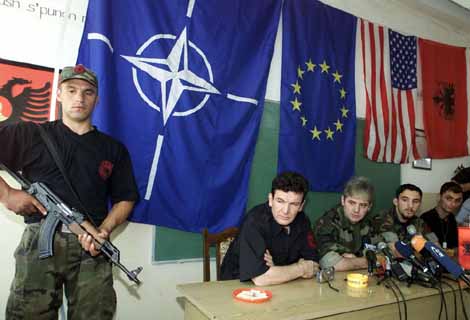 To be precise, the so-called commanders are cheap locals from society's margins, who present themselves as some positive front men for independence to the ordinary Albanians. Their number is of no importance, because everyone who presents himself as an NLA commander actually commanded over 5-6 other "soldiers," who happened to be less suave than himself. Such units do not reach the level of a platoon, according to widely used military standards, and barely reached the level of a company, when combined with the Kosovar members who came to boost the ranks. According to foreign intelligence sources, the so-called NLA commanders did not lead the conflict in Macedonia, for which maybe the most adequate term would be an uprising attempt. Every time, in every situation during the main battles, such as Tetovo, Radusha, Arachinovo, Slupchane, the chief authority rested with KLA commanders. Well trained by NATOs standards, they commanded and fought, keeping the local Albanians on their positions, preventing them from withdrawing because of the fear or inexperience. Their main task was to defeat the locals' adversity to war, in general. 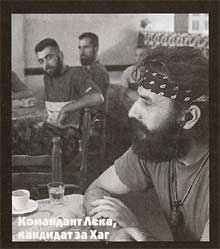
Hague candidate Commander Leka.
Who is Commander Leka?
Because of this situation, the local commanders got into NLA controllers of particular turf, mainly as local sheriffs, and to lower extent as people with authority. The choice of Daut Rexhepi, better known as a Commander Leka [an Albanian variant of the name Alexander], as commander of Tetovo region, on the road to Jazhince, was not an accident. He already totally controlled that region through his criminal enterprise.
According to various sources, it is not a secret that Leka dealt with prostitution, controlling two brothels in Tetovo long before the conflict took place. Apart from trafficking in persons, the police wanted Rexhepi, alias Leka, for infanticide, in regard to a Moldavian woman, who worked for him as a prostitute. After an abortion against her will, the woman's baby was thrown away near Poroj village. Leka was apprehended, but managed to escape from the police when they took him in the vicinity of the crime scene, where he was supposed to identify the exact place where the baby was thrown. He went in hiding in Kosovo. He returned to Poroj to organize armed "village guards" during the turbulences about the monument of the local hero Mujdin Aliu, who died while fighting for the KLA. The police also claim that Rexhepi was a direct participant in the attack against the police station in Tearce also, an innuendo for the appearance of NLA. Now calling himself Commander Leka, attempting to protect himself with a partys political immunity, is a president of Tetovos branch of DPA. Regardless of the current situation, concerning his criminal file, the NLA commander will certainly end up in the Hagues Tribunal because of the ethnic cleansing on the territory which was under his command, because of the destiny of the kidnapped civilians and the others notorious crimes, such as the destruction of Leshok monastery.
Hoxha and the Gang.
The "weight" of the other so-called NLA commanders does not differ much from Leka's. They remain executors-only, directed from the centre of the Great-Albanian ideas, now reflected into Ali Ahmeti. It remains one of many concepts, fed by local malcontents with extremist prominence. For example, the commander of Slupchane, widely know as Hoxha [Mullah] remains a typical representative of the Islamic fundamentalism. One should simply listen to his vocabulary when calling his people to jihad, to "fight the hated Slavs, a fight worth giving one's life for." His name is Jakup Asimi.
The example of Commander Xhezar Shaqiri, AKA Commander Hoxha, might be mentioned to confirm the claims about the structure of the big NLA. This nickname was particularly popular during the short war in Macedonia. Since he originates from Tanushevci village near the border with Kosovo, it is natural to ""graduate as prominent professional smuggler of everything that can be distributed through illegal channels from both sides, Arachinovo and Vitina. According to different sources, he was imprisoned in the American base Bondsteel for illegal trespassing, he was charged with drugs smuggling, as well as weapons trade. He was shot by criminal groups from Kosovo, probably because of unsettled bills, healed in the American base, released and ended as Alija Ahmeti's fighter for rights and justice. He is close to former Member of Parliament Hisni Shakiri, who after a mafia-style attack on his life in Kosovo, remains in hiding in the region of Kumanovo with about 30 bodyguards protecting him. The answer to the questions how and why he pays his escorts remains elusive. 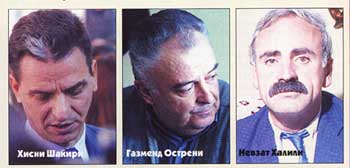 Shaqiri, Ostreni, Halili.
An anecdote reveals the true nature of the journalist-who-was-not-meant-to-be, Harulaj Misimi, alias Commander Shpati. Even though he was introducing himself as a colleague of ours, as some sort of spokesman, I havent read anything he wrote, ever. His statements about preferring the pencil to the gun became legendary. People say that these deep thoughts of his come from the fact that before the war he used to work as digger of wells. That was his talent well digging.
Do we need to include the teacher from Radusha, Msusi, who brought children to sing to him about the NLA, instead of teaching them peace and mutual respect?
Ilirida, again.
But yet, the command structure of NLA actually brings together only the radical structures of Albanian political subject, which already play with open cards, a well known targets of analysis for the many intelligence services working in the area. Precisely because of that, the centre of power, which many people claim to be located in Kosovos NDK, produces short-term leaders the likes of Hashim Tachi, Haradinaj, Halili, Ahmeti, Veliu, Asani, Kolja, Adili, Haxhirehxa, Bekiri, Ostreni Or others, all completely irrelevant. The attendance is a need, and the goal is defined.
The fight goes on, continually, only the form has changed. Use of terror to gain rights, and not using institutional means, is a consequence of the current Balkan setting. The Coordinative Council of Mala Rechica, which operated from the position of constituting a parallel system, and immediately rushed to form an Academy of Sciences for the Albanians of course to probe the power and a test balloon for all factors. The story continues, all NLA commanders now move from trenches to positions in the political parties. As always, they deploy according to need and guided by opportunism. The political position is not a key factor for this frame of mind: it's superseded by the profit made at the moment. Even though they say that in the Alitis PDP there is not a single commander, if we take into consideration the Arachinovo connection with Braha, Bear and Hoxha, or their real names Murtezani, Sulejmani, and Shaqiri, NDPs control of that region, then it's obvious that it's heavily connected to the "military" branch. Leka, Matoshi, and Zimberi sought for a place in the DPA. Chelja and Ademi in the NDP, the rest nested with Ahmetis DUI. The constant changes more or less confirm the fact that the little commanders like them need the little parties, not for political gains, but for political profit, a sanctuary from possible law-enforcing repercussions in the future. Which suits those who construct the crisis just fine. 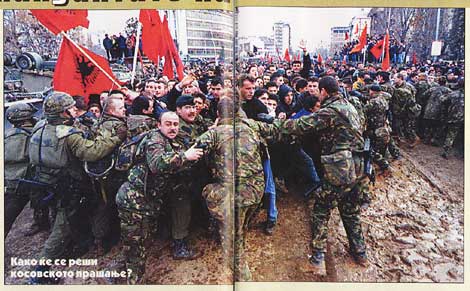 Albanian nationalists clash with French KFOR troops in Kosovo.
The Essence: The Kosovo Question.
In the meantime, there are more and more assertions that as the KLA begat the NLA, and the NLA begat ANA, and ANA should now give birth to some Liberation Army of Ilirida or some sort of similar formulation [Note: this article was published several weeks before the Army of Republic of Ilirida came to light]. The essence is much larger than the marginal so-called local commanders, so-called sheriffs, who function by the brute force of their muscles and law of Kalashnikov, and not because of political idea. This is the source of the commanders and the armies. This is why the worn out calls of Menduh Tachi and Arben Xhaferi, about the Greater Albania as a dream of all Albanians, heard during the DPAs Youth assembly should be comprehended as radical; and this is why the statements by the future constructivists DUI, that "Ohrid Agreement marks the beginning of building equal future relations between the Macedonians and the Albanians." 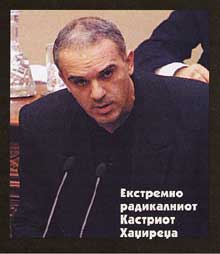
Always extreme Haxhirexha.
The continuous existence of currently "passive" armed formations, who announce their presence by sporadic shootings in the crises regions and in the regions where only Albanians live, means maintenance of instability and crises by passing the baton of radicalism to the PDP, then to DPA, then to Ahmeti, then to NDP, until eventually the Albanian question is solved. Until then, the powers behind the curtain will use all the unresolved matters to create big problems: the border with Kosovo, language use, or different interpretations of Ohrid agreement, passports, recognition and not-recognition of the election results... Until then we shall have the famous commanders, then ANA and Medmush Kolja, or the last actors from the black list of Washington, Gafur Adili, Kastriot Haxhirexha and Nevzet Halili, who will maybe form their own liberation army for their Ilirida, a fictional separatist region for which they already served jail sentences [after an unsuccessful attempt to organize paramilitaries in the early nineties].
International community, on the other hand, as a rule, warningly as always says that it will respect everything the local leaders achieve agreement with. The ones who will know to control the situation! July 19 In History.
Standartnews
In 1877, Bulgarian volunteers and the Russian contingent under the command of Gen. Gurko waged a battle with the Ottoman troops at the town of Stara Zagora.
In 1879 Prince Alexander Battenberg appointed by a decree the first Bulgarian diplomatic representatives abroad.
In 1924 the "Arsenal" armoury was set up in the town of Kazanlak.
|



